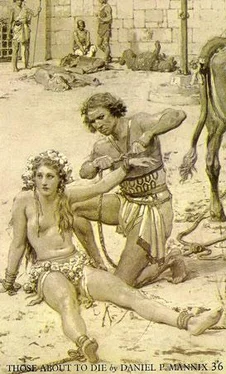Daniel Mannix - Those About to Die
Здесь есть возможность читать онлайн «Daniel Mannix - Those About to Die» весь текст электронной книги совершенно бесплатно (целиком полную версию без сокращений). В некоторых случаях можно слушать аудио, скачать через торрент в формате fb2 и присутствует краткое содержание. Год выпуска: 1972, ISBN: 1972, Издательство: Mayflower Books Ltd, Жанр: Исторические приключения, на английском языке. Описание произведения, (предисловие) а так же отзывы посетителей доступны на портале библиотеки ЛибКат.
- Название:Those About to Die
- Автор:
- Издательство:Mayflower Books Ltd
- Жанр:
- Год:1972
- ISBN:978-0583121347
- Рейтинг книги:4 / 5. Голосов: 1
-
Избранное:Добавить в избранное
- Отзывы:
-
Ваша оценка:
- 80
- 1
- 2
- 3
- 4
- 5
Those About to Die: краткое содержание, описание и аннотация
Предлагаем к чтению аннотацию, описание, краткое содержание или предисловие (зависит от того, что написал сам автор книги «Those About to Die»). Если вы не нашли необходимую информацию о книге — напишите в комментариях, мы постараемся отыскать её.
Those About to Die — читать онлайн бесплатно полную книгу (весь текст) целиком
Ниже представлен текст книги, разбитый по страницам. Система сохранения места последней прочитанной страницы, позволяет с удобством читать онлайн бесплатно книгу «Those About to Die», без необходимости каждый раз заново искать на чём Вы остановились. Поставьте закладку, и сможете в любой момент перейти на страницу, на которой закончили чтение.
Интервал:
Закладка:
Diocles retired at forty-two with a fortune of 35 million sesterces (about Ј600,000). We know so much about him because he published a book of memoirs, ghost-written by a contemporary sports writer. Diocles claims to have been the greatest charioteer of all time (he was undoubtedly the most successful financially) although he admits some other drivers won more races than he did. "But what kind of races?" he asks. "On some provincial track running against a lot of plugs. Now, I was always in the big-time events at the Circus Maximus, running against stiff competition. No other driver won over a thousand races under those conditions."
Very few charioteers were as lucky as Diocles. Fuscus Was killed at twenty-four after only fifty-seven wins. Aurelius Mollicus, judging from his double name a freeman, not a slave, was killed at twenty after a hundred and twenty-five wins. However, all these men had statues made in their honour with glowing inscriptions which were intended to, and have, made them immortal. The inscriptions read: “ Never lost the lead at the Ludi Plebi!" "Came from behind to win at the Ludi Apollinares." "An unknown who really fooled the wise ones." And so on. There they stand in museums for the benefit of tourists, good-looking men most of them, with powerful forearms and tremendous shoulders. They lived high, wide and handsome, and their end generally came under the flashing hoofs of horses while the crowd yelled with excitement or thought: "There go my ten sesterces."
It was often said: "The great spectacle at the circus is not the games but the spectators." The games were the great emotional outlet for the mob and they made the most of it. During a race the crowd literally went mad. Women collapsed or had sexual orgasms. Men bit themselves, tore their clothes, did mad dances, bet until they ran out of money, and then bet themselves to a slave dealer to raise more. One man fainted when the White team fell behind. When the Whites came forward to win in the last lap, the man had to be revived to be told of his good luck. Travellers approaching Rome could hear the roar of triumph when the race was over before they could see the city towers. If a faction thought that its team had got a raw deal, they staged a riot—on one occasion setting fire to the Circus Maximus and burning it to the ground. It was after that a law was passed saying that all amphitheatres had to be built of stone, although the upper tiers were still frequently made of wood.
This mania even had a name—it was called Hippomania: horse-madness. When Felix, a famous charioteer for the Reds, was killed in a race and his body burned on a funeral pyre, a man threw himself into the flames so he could perish with his idol. A nobleman's little boy, when asked what of all things on earth he wished as a gift, asked for the tunic worn by a famous charioteer for the Greens. When the Germans were attacking Carthage, the people refused to defend the walls—they were busy watching a chariot race. When Treves was burned by the barbarian hordes, the city council pointed out that the disaster had its good side. "Now we'll have room to build a really fine chariot course in the middle of the city," the governor pointed out.
To show how the passion for chariot racing grew: in 169 b.c. there was one race a day during the games, held late in the afternoon as a climax to the sport. Under Augustus Caesar at the time of Christ, there were twelve races a day. Under Caligula forty years later, there were twenty-four races a day. Two more racing corporations were formed so that six chariots competed instead of the usual four. Later, the number was increased to twelve and even sixteen chariots, but by then the mob had lost all interest in real driving and only wanted to see a lot of smash-ups.
CHAPTER TWO
In the early days when the games were merely athletic contests there were no gladiatorial combats. Gladiators were introduced by accident. Two brothers named Marcus and Decimus Brutus wanted to give their dead father a real bang-up funeral. The brothers were wealthy patricians, the ruling class in Rome, and provided outstanding funeral rites for a dead parent was an important social obligation. The usual processions, sacrificial animals and prayers weren't enough for the brothers, but Marcus came up with an idea.
"There was an old custom, dating back to prehistoric times, of having a few slaves fight to the death over the grave of some great leader," he reminded his brother. "Why not revive it to show how much we revere the memory of the old man?"
Decimus turned the suggestion over in his mind. Originally this ceremony had been a sort of a human sacrifice, and the souls of the dead slaves were supposed to serve the chieftain in the next world. The fighting was to make sure that only brave men capable of being good followers would follow the dead leader. Educated Romans like the Brutus brothers didn't believe this old superstition, but the dead man had been a great soldier and fond of rough sports.
"Nothing would please father more" he admitted. "If the priests agree, we'll do it Our social position will be definitely established."
The priests had no objections and half of Rome turned out to watch the fight. Three pairs of slaves fought and the crowd loved it. The brothers became the most popular men in Rome for having put on such a good show. Politicians, eager to be elected, decided to put on similar exhibitions. The following statistics will show how fast the idea caught on:
264—b.c. 3 pairs of slaves.
216—b.c. 22 pairs of slaves.
183—b.c. 60 pairs of slaves.
145—b.c. 90 pairs fought for three days.
Soon it was taken for granted that anyone running for office had to put on slave fights—the bigger the better.
Promoters began to buy up able-bodied slaves, criminals and prisoners of war especially for these fights. The promoters would then rent the men out at so much per head to any ambitious politician. These professional slave-fighters became known as "gladiators," meaning "swordsmen."
As long as only a few gladiators were engaged, the fights were generally given in the Forum, but when several dozen fought there wasn't enough room. So the fights were moved to the Circus, and the gladiators staged their combats as an extra attraction together with the chariot races, the acrobats, the wild animal trainers and the other performers. Unless the show was subsidized by some wealthy man in honour of his ancestors, an admission fee was charged and the whole affair was strictly a business proposition, but later politicians started putting on the shows for free to get votes, or the government staged them to keep the mob quiet
Unfortunately, no gladiator was kind enough to leave a collection of memoirs or, if any did, the manuscript hasn't survived. However, we know plenty about them as many of the Roman writers such as Suetonius, Martial, and Tacitus described the fights in considerable detail. We know, for example, that one of the most famous gladiators was named Flamma and, although we know very little else about him except a list of his outstanding triumphs, we can by combining stories about several of the gladiators give a reasonably accurate picture of one of these professional killers.
Let's suppose that Flamma was a huge, heavy-set bull of a man. Most gladiators were, as their statues and the portraits of them cut on monuments show. He may well have been a private soldier, condemned to the arena for insubordination. We know of one such case, and we'll suppose the man involved was Flamma.
Читать дальшеИнтервал:
Закладка:
Похожие книги на «Those About to Die»
Представляем Вашему вниманию похожие книги на «Those About to Die» списком для выбора. Мы отобрали схожую по названию и смыслу литературу в надежде предоставить читателям больше вариантов отыскать новые, интересные, ещё непрочитанные произведения.
Обсуждение, отзывы о книге «Those About to Die» и просто собственные мнения читателей. Оставьте ваши комментарии, напишите, что Вы думаете о произведении, его смысле или главных героях. Укажите что конкретно понравилось, а что нет, и почему Вы так считаете.












